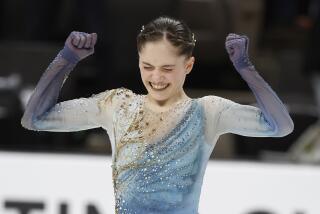In men’s free skate, it’s a real free-for-all
- Share via
Reporting from Vancouver, Canada — It is customary to watch figure-skating practices for omens, even though the exercise serves mainly to see if one skater runs into another or suffers a non-contact injury.
Skaters who practice well often fall apart in competition, and vice-versa, as was the case with Japan’s Daisuke Takahashi, who struggled for days before delivering a lights-out performance in Tuesday’s Olympic men’s short program.
Takahashi also went feet-first into the boards after slipping on a footwork sequence during practice Wednesday, but that fall, which left him laughing, will have no impact on Thursday’s free skate.
What does matter is whether he stays upright during a planned attempt of a quadruple jump.
And that is why Evan Lysacek almost certainly won’t try a quad, for reasons both strategic and physical.
Recurrence of pain from an old stress fracture in his left foot has severely limited Lysacek’s ability to practice the quad, and he won the 2009 world title without one.
“If you miss it and fall, you could mess up the final 4 minutes, 15 seconds of your program,” NBC commentator Sandra Bezic said. “It isn’t worth the risk unless you have about an 85% success rate.”
That is the sort of consistency Russia’s Evgeni Plushenko can count on, so he plans at least one quadruple jump in his program. Because he has the advantage of skating last in the 4-minute, 30-second free skate, reigning Olympic champion Plushenko might try a second quad if he thinks he needs the points it could bring.
Six-tenths of a point separate Plushenko, Lysacek and Takahashi after the short program, during which the Russian had the only quadruple jump of the three.
There is no meaningful way to determine whether a quad or two would decide the outcome if Plushenko and Lysacek skate error-free programs.
Lysacek lost 4.9 points to Plushenko on the scores for the four jumps in the short program but gained back 2.15 on the component -- or presentation -- scores and an additional 2.1 on the technical scores for spins and footwork.
It is more likely that a significant error will prove decisive. Neither Plushenko nor Lysacek has skated a flawless long program this season.
“I don’t think there is any element now in the free skate for all three of us that is more important than any other,” Lysacek said. “I guess I can speak for both sides and say for me it’s just as difficult to have the intricate program that I have and execute everything in there as it would for me to execute a quad.
“Unfortunately, my foot hasn’t held up quite as well as I wanted it to, so most likely it’s not in the cards for me here. I’d like to make it through the free skate, first and foremost.”
More to Read
Go beyond the scoreboard
Get the latest on L.A.'s teams in the daily Sports Report newsletter.
You may occasionally receive promotional content from the Los Angeles Times.






